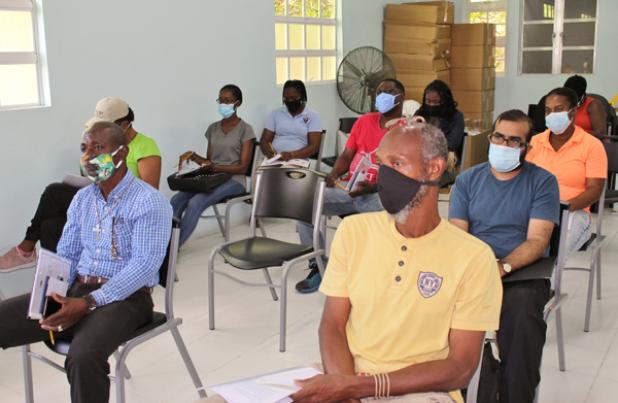
Participants gathered for the final beekeeping training session at the Ministry of Agriculture.
Efforts on to increase honey production
A strategic effort is being made to ensure that more beekeepers in Barbados get the training they need to rear high quality bees, thereby increasing local honey production and reducing the need to import honey and its various by-products.
Brett Taylor, Senior Agricultural Officer in charge of Food Crops, acknowledged the above on the last day of a training workshop in beekeeping, which was held at the Central Agronomics Research Station and Graeme Hall Apiary, at the Ministry of Agriculture and Food Security yesterday.
“In the Estimates process of 2018 to 2019, the Honourable Prime Minister (Mia Amor Mottley) provided the Ministry of Agriculture and in particular the Food Crops Research and Extension and Development section with funding to increase the amount of beekeepers – and the interest in beekeeping as a whole – around the island. The Beekeeping Unit was resuscitated by former chief agricultural officer Mr. Lennox Chandler and during that time, the Food Crops Research Division started to increase the number of hives at the Ministry,” Taylor explained.
“We have an apiary and we also have a resident beekeeper, Ms. Lynette Rudder, who is in charge of the apiary. The funds were also used to train new persons in beekeeping, in how to rear queens. For the industry to expand, we must have a method of increasing or bringing new, high-quality queens into production. So we had assistance from the University of Florida and the Argentina Embassy in bringing in resource personnel to do training. So these sessions that we’ve had, two last week and then today, are part of the training that the Ministry of Agriculture is having to encourage beekeeping around the island,” Taylor further commented.
He added, “The training is to encourage the increase in the production of honey around the island. We do just a small percentage of the honey that is used in Barbados. A lot of the honey is imported, so we are looking to cut down on that amount.”
Taylor pointed out that there is a lot of testing to be done on the imported honey sold on the local market, to ensure that it is not “adulterated” – that is, made poorer in quality via the mixing in of other substances such as water or different kinds of syrup, for example.
“So those are the things that you have to look at. The whole idea then would be one, increasing honey production and the keeping of bees, along with the million tree drive. Because with this million tree drive, obviously we are going to be planting trees that are favourable or trees that the bees love. So this is all part of a national drive to increase the production of honey,” Taylor stated.
